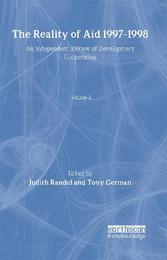
|
The Reality of Aid: An Independent Review of Development Cooperation: 1997-1998
Hardback
Main Details
| Title |
The Reality of Aid: An Independent Review of Development Cooperation: 1997-1998
|
| Authors and Contributors |
By (author) Judith Randel
|
|
By (author) Tony German
|
| Series | Aid and Development Set |
|---|
| Series part Volume No. |
10
|
| Physical Properties |
| Format:Hardback | | Pages:222 | | Dimensions(mm): Height 234,Width 156 |
|
| Category/Genre | Sustainability |
|---|
| ISBN/Barcode |
9781849710497
|
| Classifications | Dewey:338.91 |
|---|
| Audience | | General | | Tertiary Education (US: College) | |
|---|
|
Publishing Details |
| Publisher |
Taylor & Francis Ltd
|
| Imprint |
Earthscan Ltd
|
| Publication Date |
1 October 2009 |
| Publication Country |
United Kingdom
|
Description
NOW IN ITS FIFTH ANNUAL EDITION, The Reality of Aid continues to present the most comprehensive and rigorous independent analysis available of the aid and development policies of the world's richest nations, and exposes the gaps between rhetoric and reality. Part I presents a consideration of current issues in development cooperation in the context of globalisation and the increasing importance of private aid flows. Part II gives a full-report on the performance of OECD countries and the European Union over the last year, and also includes a report on the continuing Lomi? negotiations between the EU and Africa. Part III gives a Southern perspective, with chapters on development and cooperation in Argentina, Central and Eastern Europe, Ghana, Guatemala, Haiti, India, Latin America, Uganda and Zimbabwe. Part IV reviews trends in aid policy and spending by Northern governments and NGOs, with 'at a glance' tables and charts which compare donors' performance on issues such as poverty eradication, gender, emergency relief, leadership and public information. Throughout, information is presented in easily interpreted diagrams and graphs. First produced in 1993, The Reality of Aid has established itself as a unique source of independent evaluation and comment on aid policies and development. It is indispensable for all in the field, whether in the official or voluntary sectors. Originally published in 1997
|